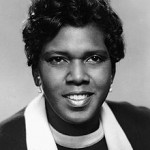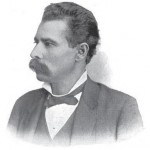One Day in Texas, Two Different Responses to Our Confederate Legacy
As Austin honored a former slave, Panola County celebrated the Confederacy and ignored his brother.
Photo: Milton M. Holland, a former slave and recipient of the Medal of Honor from Panola County, is buried in Arlington National Cemetery. (Photo by R.G. Ratcliffe)
(Texas Monthly) On April 26, citing its intent to celebrate the history and culture of the region, the Panola County Commissioner’s Court celebrated Confederate Memorial Day—ignoring the most highly decorated soldier from that county, Milton Murray Holland, a slave who was born there and who fought for the North. He grew up on a plantation five miles west of Carthage, was freed by his white father, and earned the Medal of Honor fighting for the Union in Virginia. When I brought up Holland’s name with County Judge Lee Ann Jones, she had never heard of this native son of Panola County who is now buried with honors in Arlington National Cemetery.
On that same day last month, the Austin City Council honored Holland’s older brother by changing the name of a street from Jeff Davis Avenue to William H. Holland Avenue. The council recognized Holland’s work running freemen’s schools, serving on the Travis County commissioner’s court, and successfully pushing the Legislature in 1887 to create a school for blind and deaf African American children of Texas. Also, as a member of the Texas Legislature in 1876, Holland passed the bill creating what became Prairie View A&M University. But until recent years, his name had been all but lost to history.
How two local Texas governments could remember the Civil War and Reconstruction in such different ways on the same day this year is emblematic of a national struggle to come to grips with the nation’s original sin of slavery a century and a half earlier. (more)
Zora Neale Hurston’s ‘Barracoon’ Tells the Story of the Slave Trade’s Last Survivor
Published eight decades after it was written, the new book offers a first-hand account of a Middle Passage journey
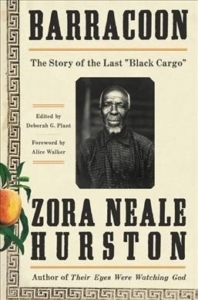 (Smithsonian.com) Sitting on his porch in 1928, under the Alabama sun, snacking on peaches, Cudjo Lewis (born Oluale Kossola) recounted to his guest his life story: how he came from a place in West Africa, then traversed the Middle Passage in cruel and inhumane conditions on the famed Clotilda ship, and saw the founding of the freedman community of Africatown after five years of enslavement. After two months of listening to Kossola’s tales, his interlocutor asked to take his picture. Donning his best suit, but slipping off his shoes, Kossola told her, “I want to look lak I in Affica, cause dat where I want to be.”
(Smithsonian.com) Sitting on his porch in 1928, under the Alabama sun, snacking on peaches, Cudjo Lewis (born Oluale Kossola) recounted to his guest his life story: how he came from a place in West Africa, then traversed the Middle Passage in cruel and inhumane conditions on the famed Clotilda ship, and saw the founding of the freedman community of Africatown after five years of enslavement. After two months of listening to Kossola’s tales, his interlocutor asked to take his picture. Donning his best suit, but slipping off his shoes, Kossola told her, “I want to look lak I in Affica, cause dat where I want to be.”
His listener, companion and scribe was Zora Neale Hurston, the celebrated Harlem Renaissance author of Their Eyes Were Watching God. She poured his story, told mostly in his voice and dialect, into Barracoon: The Story of the Last “Black Cargo.” After eight decades, the manuscript is finally being published next week. (The title comes from the Spanish word for an enclosure where slaves were kept before the Middle Passage journey.) (more)
Related: NPR book review
Last Hired, First Fired: How the Great Depression Affected African Americans
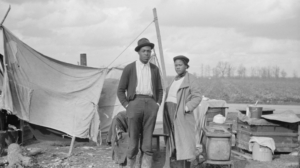
Evicted sharecroppers along Highway 60, New Madrid County, Missouri, 1939. (Credit: Arthur Rothstein/FSA/The Library of Congress)
(History.com) Lasting from 1929 to 1939, the Great Depression was the worst economic downtown in the industrialized world. While no group escaped the economic devastation of the Great Depression, few suffered more than African Americans. Said to be “last hired, first fired,” African Americans were the first to see hours and jobs cut, and they experienced the highest unemployment rate during the 1930s. Since they were already relegated to lower-paying professions, African Americans had less of a financial cushion to fall back on when the economy collapsed.
The Great Depression impacted African Americans for decades to come. It spurred the rise of African-American activism, which laid the groundwork for the Civil Rights Movement in the 1950s and 1960s. The popularity of President Franklin D. Roosevelt and his New Deal program also saw African Americans switch their political allegiances to become a core part of the Democratic Party’s voting bloc.
Prior to the Great Depression, African Americans worked primarily in unskilled jobs. After the stock market crash of 1929, those entry-level, low-paying jobs either disappeared or were filled by whites in need of employment. According to the Library of Congress, the African-American unemployment rate in 1932 climbed to approximately 50 percent. (more)
TIPHC Bookshelf
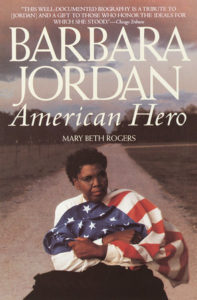 Published scholarship on black history in Texas is growing and we’d like to share with you some suggested readings, both current and past, from some of the preeminent history scholars in Texas and beyond. We invite you to take a look at our bookshelf page – including a featured selection – and check back as the list grows. A different selection will be featured each week. We welcome suggestions and reviews. This week, we offer, “Barbara Jordan, American Hero,” by Mary Beth Rogers.
Published scholarship on black history in Texas is growing and we’d like to share with you some suggested readings, both current and past, from some of the preeminent history scholars in Texas and beyond. We invite you to take a look at our bookshelf page – including a featured selection – and check back as the list grows. A different selection will be featured each week. We welcome suggestions and reviews. This week, we offer, “Barbara Jordan, American Hero,” by Mary Beth Rogers.
Barbara Jordan was the first African American to serve in the Texas Senate since Reconstruction, the first black woman elected to Congress from the South, and the first to deliver the keynote address at a national party convention. Yet Jordan herself remained a mystery, a woman so private that even her close friends did not know the name of the illness that debilitated her for two decades until it struck her down at the age of fifty-nine.
In “Barbara Jordan,” Mary Beth Rogers deftly explores the forces that shaped the moral character and quiet dignity of this extraordinary woman. She reveals the seeds of Jordan’s trademark stoicism while recapturing the essence of a black woman entering politics just as the civil rights movement exploded across the nation. Celebrating Jordan’s elegance, passion, and patriotism, this illuminating portrayal gives new depth to our understanding of one of the most influential women of our time-a woman whose powerful convictions and flair for oratorical drama changed the political landscape of America’s twentieth century.
This Week in Texas Black History
May 8
 On this day in 1958, Lovie Lee Smith was born in Big Sandy, Texas. In high school, he led the Big Sandy Wildcats to three consecutive state championships and was all-state three years as an end and linebacker. Smith was a two-time All-America and three-time All-Missouri Valley Conference defensive back at the University of Tulsa. As head coach of the Chicago Bears, in 2007, he became the first African-American professional head coach to qualify a team for the Super Bowlwhen the Bears beat the New Orleans Saints, 39-14, in the NFC championship game. However, the Bears lost in Super Bowl XLI to the Indianapolis Colts, 29-17.
On this day in 1958, Lovie Lee Smith was born in Big Sandy, Texas. In high school, he led the Big Sandy Wildcats to three consecutive state championships and was all-state three years as an end and linebacker. Smith was a two-time All-America and three-time All-Missouri Valley Conference defensive back at the University of Tulsa. As head coach of the Chicago Bears, in 2007, he became the first African-American professional head coach to qualify a team for the Super Bowlwhen the Bears beat the New Orleans Saints, 39-14, in the NFC championship game. However, the Bears lost in Super Bowl XLI to the Indianapolis Colts, 29-17.
May 9
In 1974, U.S. Rep. Barbara Jordan was among the members of the House Judiciary Committee which opened hearings on whether to recommend the impeachment of President Richard Nixon in the Watergate controversy. On July 25th, Jordan delivered a powerful message to the committee reminding her colleagues of the Constitutional basis for impeachment. Jordan asserted, “My faith in the Constitution is whole, it is complete, it is total. I am not going to sit here and be an idle spectator to the diminution, the subversion, the destruction of the Constitution.”
May 11
In 1994, Dr. Carol Surles becomes first African-American president of Texas Women’s University in Denton. A native of Florida, Surles earned her undergraduate degree in psychology at Fisk University in Nashville, her master’s degree in counseling from Chapman College in California, and her doctoral degree in education from the University of Michigan-Ann Arbor.
May 12
On this day in 1846, Norris Wright Cuney was born on a plantation near Hempstead. Cuney was the child of a white planter, Philip Minor Cuney and his slave, Adeline Stuart. Norris was educated at the Wylie Street School for blacks in Pittsburgh, Pennsylvania. He returned to Texas following the Civil War and settled in Galveston, where he became active in the Union League, the political arm of Radical Republican Reconstruction in Texas. Cuney became a powerful figure in Texas’ Republican circles, especially in Galveston and was appointed secretary of the Republican State Executive Committee in 1873, the highest party rank achieved by a Southern African American in the remaining decades of the century. In 1886, he was named the Republican Party’s national committeeman from Texas.
Blog: Ron Goodwin, Ph.D., author, PVAMU history professor
Ron Goodwin is an assistant professor of history at Prairie View A&M University. Even though he was a military “brat,” he still considers San Antonio home. Like his father and brother, Ron joined the U.S. Air Force and while enlisted received his undergraduate degree from Texas Lutheran University in Seguin, Texas. After his honorable discharge, he completed graduate degrees from Texas Southern University. Goodwin’s book, Blacks in Houston, is a pictorial history of Houston’s black community. His most recent book, Remembering the Days of Sorrow, examines the institution of slavery in Texas from the perspective of the New Deal’s Slave Narratives.
Recent Posts
King of Kings
During his lifetime Martin Luther King consistently paralleled the experiences of the biblical Children of Israel and the experiences of Africans in America. As a result, he thrust himself into the role of Moses. What I find interesting in these parallels was the ultimate goal of the story. The Children of Israel, after 400 years of bondage, eventually made their way to the Promised Land. This was the message that I believe King was ultimately
Wakanda Forever — Part 2
The internet records the following regarding the financial success of the Black Panther as of March 25, 2018: Receipts grossed $631.4million in the US and Canada and a worldwide total of $1.239 billion; The film made $370.5million worldwide in its opening weekend (the 15th largest of all time); Thus far, Black Panther is the highest-grossing solo superhero film and the 3rd third highest-grossing movie in the Marvel Cinematic Universe (MCU); and In only five weeks after
Submissions wanted
Historians, scholars, students, lend us your…writings. Help us produce the most comprehensive documentation ever undertaken for the African American experience in Texas. We encourage you to contribute items about people, places, events, issues, politics/legislation, sports, entertainment, religion, etc., as general entries or essays. Our documentation is wide-ranging and diverse, and you may research and write about the subject of your interest or, to start, please consult our list of suggested biographical entries and see submission guidelines. However, all topics must be approved by TIPHC editors before beginning your research/writing.
We welcome your questions or comments. Please contact Mr. Michael Hurd, Director of TIPHC, at mdhurd@pvamu.edu.

